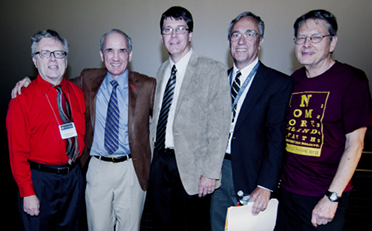
Florida freethought
From left at the Tallahassee debate were Gary Whittenberger, Dan Barker, Bryan O’Neal, Mark Hohmeister and a representative of Ratio Christi.
A question long discussed around campfires, in caves, dorm halls, churches, classrooms, coffee shops and various other settings throughout history is “does God exist?” And so it was on Sept. 10 at the Challenger Learning Center in downtown Tallahassee, Fla.
Arguing for the affirmative position was Bryan O’Neal, professor of theology and dean of faculty at the Moody Bible Institute in Chicago. Taking the negative position was Dan Barker, an evangelist turned atheist and co-president of the Freedom from Religion Foundation in Madison, Wis. Debate moderator was Mark Hohmeister, associate editor of the Tallahassee Democrat.
The event was hosted by the Center for Inquiry-Tallahassee. Co-sponsors included Ratio Christi, Freethinkers’ Forum, the Unitarian Universalist Church of Tallahassee, Tallahassee Atheists, First Coast Freethought Society, Humanists of Florida Association, Joan Patterson, Neil Mooney and Richard and Elaine Hull.
For more than two hours, the debaters vigorously defended their positions before an audience of 175 and afterward answered audience questions and engaged in informal discussions and book signings.
Seventy-eight percent of the audience completed an opinion survey consisting of one question posed before the debate and two questions posed after the debate. They were asked to answer the question “Does God exist?” (pre- and post-debate), choosing among five options: “definitely yes, probably yes, can’t decide, probably no, and definitely no.”
The definition of “God” used in the survey was one commonly held among believers in the “Abrahamic faiths” and one which the debaters had agreed to use prior to the debate. “God” was defined as “a being, intelligent agent, or person who is all-knowing, all-powerful, and perfectly good, who created the cosmos and is the supreme moral authority.”
Audience members were also asked near the conclusion “Who won the debate?”
Before the debate, 21.3% of those who completed the survey answered they were theists or believers in God, 5.1% said they were agnostics or undecided, and 71.3% identified as atheists or nonbelievers. Overall, 11.8% thought O’Neal won the debate, 69.9% thought Barker won and 11% thought it was a tie. Given the composition of the audience, this result was not too surprising.
Minds were changed
Although most people (82.4%) didn’t change their opinions about the existence of God from before the debate to afterward, 24 persons (17.6%) did. Of these individuals who had a change of mind, 16 (66.7%) changed in the direction of diminished belief in God, four (16.7%) changed in the direction of increased belief, and for four others (16.7%), the direction of change was ambiguous.
For those who began the debate as atheists, 3.1% thought O’Neal won, 84.5% thought Barker and 8.2% thought it was a tie. For the agnostics (who marked “can’t decide”), 14.3% favored O’Neal, 57.1% favored Barker and none thought it was a tie.
The most surprising result came from the theists, among which 37.9% thought O’Neal won, 31% thought Barker won and 24.1% thought it was a tie. Almost as many believers perceived Barker as the winner as thought O’Neal won.
For those who changed their belief about the existence of God, changes were in small increments, as might be expected in a 150-minute debate. Twenty of 24 (83.3%) who changed their minds did so by only one level. For example, the most common change to “Does God exist?” was from “probably no” to “definitely no.”
One surprising and rather disappointing fact was that before the debate, the religious community of Tallahassee did not come forward to support O’Neal even though he is an articulate apologist and a Presbyterian. Of five local Presbyterian churches which were invited to be debate co-sponsors, two declined and three never responded. Of approximately seven other religious groups invited to be co-sponsors, only one (Ratio Christi) agreed to support O’Neal and the debate’s goals.
This general lack of support seems inconsistent with a well-known bible verse (1 Peter 3:15): “But sanctify Christ as Lord in your hearts, always being ready to make a defense to everyone who asks you to give an account for the hope that is in you, yet with gentleness and reverence.”
These survey results are consistent with a general U.S. trend toward secularization. On religious issues, most people are not changing their minds but some are, and among those who are, most are becoming less religious.
FFRF member Gary Whittenberger is a retired psychologist and current secretary of the Center for Inquiry–Tallahassee.

